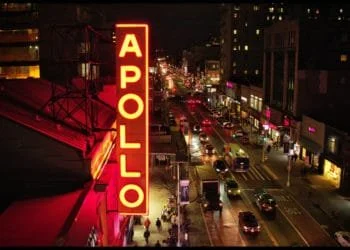Deadline: “Tribeca Film Festival Celebrates Harlem Landmark With Opening Night HBO Doc ‘The Apollo’; Robert De Niro Gets An ‘Amen’ For Slamming Trump”
The Tribeca Film Festival in recent years has opened with documentaries about the soul and institutions that are pillars of New York City, whether with subjects like Saturday Night Live or local native and music mogul Clive Davis, and this year was no exception as the 18th Robert De Niro-Jane Rosenthal co-created event shined a spotlight on Harlem’s holy entertainment venue: The Apollo Theater on 125th street, subject of the premiering Roger Ross Williams’ HBO documentary The Apollo.
“Every time I set foot in this hall of art and entertainment, I can feel its incredible history. I hear the echoes of the artists who performed here, the audiences who came here to be entertained, to applaud, sometimes to jeer, and often to be moved. In these disturbing times when the administration is promoting divisiveness and racism, by being here tonight, we’re making a statement that we reject it,” said De Niro to great cheers.
“No you don’t! Not in this house! Not on this stage!,” De Niro shouted at the Donald Trump presidential administration.
“Amen!” responded attendees in the house.
Typically, Tribeca kicks off the festival at the Upper West Side Beacon Theatre which seats 2,894. With The Apollo, natch, premiering at The Apollo, attendance was smaller this year given the venue’s three-tiered 1,506 seating capacity.
The doc, a six year journey in the making, covers plenty of ground, largely beginning with the theater’s swing era (The Apollo was built in 1913-14) of Duke Ellington and Dizzy Gillespie, moving to Ella Fitzgerald forgetting her lines in a song and finding her scatting voice, to a 13-year old Lauryn Hill getting rejected by the crowd (only to return years as an adult and knock their socks off), to James Brown being a beacon during the black-power revolution with his anthem “Say It Loud — I’m Black and I’m Proud” and to President Barack Obama becoming the first U.S. President to step onto the legendary stage of African American art and culture which has triumphed over racism and oppression through history.
One of the more current-day story lines running throughout the doc is the stage rehearsal and 2018 spoken word performance of Ta-Nehisi Coates’ “Between the World and Me,” the author’s letter to his teenage son about the feelings, symbolism, and realities associated with being black in the United States and the racist violence woven into American culture. In the face of adversity, The Apollo was a safe haven for the voice, no matter how big or small, of African American culture.
Largely run by Frank Schiffman during the swing and Motown eras, he amassed a huge index card file on acts that played there, how much each grossed, and a brief and blunt critique of their performances. That said, while the Cotton Club and Savoy had white-only audiences, The Apollo was a venue that African Americans could call their own. Quite often more established black acts during the Motown era would forgo playing the establishment in favor of white only venues, but that changed when The Apollo reached out to Eartha Kitt, who made a point to absolutely play there.
It was through Schiffman’s talent booker Ralph Cooper that The Apollo first launched its legendary Amateur Nights, giving a voice to fresh and burgeoning comedy and musical acts. New talent would come in from around the country, sometimes broke, for a shot to audition. The crowd at The Apollo was scary for any performer, as Richard Pryor explains in the film, being known to boo acts off stage. However, The Apollo wasn’t a venue for button-down dramatic theater, but for passion and soul. Booing was a right of passage and for any act gracing the stage, it only served to make them better.
Keeping The Apollo alive financially was always a risky proposition (even with Gladys Knight & The Pips performing several shows from 11am to 11pm during their 1960s beginnings) and the business model couldn’t sustain itself through various owners. In 1991 the state of New York bought the Apollo and created the non-profit Apollo Theater Foundation to run it.
Last night, Williams, who won an Oscar for the 2010 short subject doc Music by Prudence, said, “For 85 years, the greatest talent in history graced this stage. Tonight is about celebrating that history and what it means to black people. Our struggles are defined by our music and our art. This film is a celebration of how far we’ve come, but how farther we need to go. In the words of my esteemed composer Robert Glasper, ‘Don’t turn back now, we’ve come too far not to make it.’”


